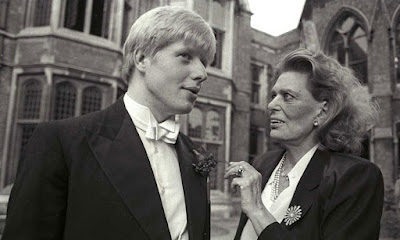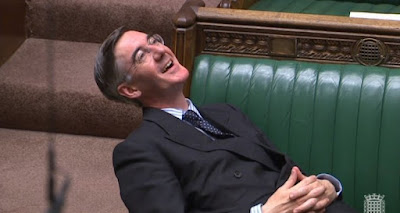My debt to Simon Kuper and his analysis in Chums - How a Tiny Caste of Oxford Tories Took Over the UK (2022) - is obvious and acknowledged. His Oxford years as an undergraduate (Magdalen [?] 1988-91) were contemporary and near-contemporary with so many of the men and women who now have political power in the UK. That experience has left him curious enough to do the research and come to the conclusions that he offers in his admirable book. I was an undergraduate at Catz (St Catherine's) from 1967 to 1970, around two decades before these Oxford hot-shots. But Kuper's Oxford was little different from mine. Now, thank goodness, much has changed for the better - but too late to have stopped the rot we now endure.
 |
| The Radcliffe Camera library in the centre of the university city |
This is a cast list of the Oxford Tories who have shaped our land - yours and mine. I have added their secondary schooling (all private, apart from Truss's), Oxford college and the years they were 'up', as the insiders used to say:
- Boris Johnson Eton; Balliol (1983-87)
- Michael Gove Robert Gordon's College, Aberdeen; Lady Margaret's Hall (1985-88)
- David Cameron Eton; Brasenose (1985-88)
- George Osborne St Paul's, London; Magdalen (1990-1993)
- Dominic Cummings Durham School; Exeter (1991-94)
- Daniel Hannan Marlborough; Oriel (1990-1993)
- Jacob Rees-Mogg Eton; Trinity (1988-91)
- Rishi Sunak Winchester; Lincoln (1998-2001)
- Liz Truss Roundhay, Leeds comprehensive; Merton (1993-1996)
I would undo much of what they have created, but then I am a Quaker socialist with deeply-held convictions about how people should be valued, helped to live well, and enjoy fruitful lives. For these
Tories, a life in politics has been for the most part about themselves. It has been a game..jpeg) |
| My game is running - this time nearing the end of the Oxford half-marathon, rounding the Radcliffe Camera library in the city centre in 2016 |
Simon Kuper is good on the class war. 'The British establishment', Kuper argues, 'is perennially on the lookout for fast-rising outsiders to recruit to the ranks'. Middle-class offspring who went to grammar schools, even those who went to comprehensives, could be accepted at Oxford colleges (and of course at Cambridge colleges) if they were regarded as bright enough. There, they could be trained to feel at ease in establishment settings.
However, for public schoolboys who had been boarders Oxford was just a natural stage in the pursuit of their destiny. Boarding schools helped create a 'toff caste', into which selected outsiders like Johnson - a child of the bohemian upper middle class - could be initiated by learning the codes and speech rules from the age of seven'.
For toffs who had been to elite public schools such as Eton, Harrow, and Winchester, their school connections might go back generations. For an Etonian such as Cameron, it was Eton more than Oxford that would provide him with some of his closest political allies - Ed Llewellyn, Oliver Letwin, Jo Johnson, to name a few. For Johnson, Gove, Hannan and others, it was the Oxford years that were to prove critical in their pursuit of power and influence.
 |
| Boris Johnson, President of the Oxford Union, with a guest speaker |
Only 7 percent of the British population attend public schools and only 1 per cent attend public schools that are also boarding schools. From this 1 per cent, those who found themselves at Oxford were able to create their own private universe. Boarders such as Johnson arrived at Oxford knowing scores of people from school - and then they set about establishing a network with the toffs they didn't know.
Simon Kuper is good on the big-picture sense of history, too. I find this paragraph particularly insightful:
'In the 1980s, the upper classes were regaining the confidence that had been [lost] during Britain's social democratic 1945-1979 era. In that period the UK had lost its superpower status, and had been overtaken economically by much of western Europe - but, by 1979, British income equalities reached their lowest point ever recorded, according to Danny Dorling, professor of Geography at Oxford. Then along came Margaret Thatcher who restored inequality.'
.jpg) |
| Margaret Thatcher (1925-2013) - her Oxford degree was in chemistry; she was at Somerville (1943-47) |
Exactly. Thatcher also brought an ideological commitment to neoliberalism - the economic policy that has never succeeded. Creating a smaller state, removing regulations to help the rich get richer, and lowering the tax burden on the already wealthy has been a recipe for economic stagnation in the UK since 1979 - wealth doesn't 'trickle down' as it is supposed to in their madcap economic thinking.
Watch this nasty and dangerous ideology fail again under Truss's premiership.
But for now back to Oxford in the 1980s where Conservatives such as Johnson and Cameron thought of the 'real' England in terms of the pre-industrial past. The fraction of the city where most students lived - the square mile of the university buildings at its centre - remained remarkably untouched by modern developments. For many of those who passed three critical years under the spell of Oxford's spires, their development into adulthood was shaped by nostalgia for a past where England was 'great' and all things British were best. In other words, to use a Johnsonian Tory boast, when we were 'world-beaters'. This fantasy land was the seed-bed for the Brexit project.
We do have world-class scientists and engineers, but modern Oxford has also created a niche in which, in Kuper's words, its graduates 'have become the politicians and civil servants who administrate the British state, the lawyers and accountants who service the economy, and the pundits who narrate the show.' Within this elite group of Oxford graduates who went into politics, all the leading Oxford Tory Brexiteers had studied subjects which reinforced their instincts for the putative glory days of Britain. Johnson read classics, Rees-Mogg read modern history, Cummings read ancient and modern history, and Gove read English.
 |
| Rees-Mogg, taking a rest in the House of Commons chamber |
By contrast, those Oxford students such as Cameron, Hunt, Hammomnd, Hague, Hancock and Truss, who had read the most popular of modern degrees, PPE - philosophy, politics, and economics - were overwhelmingly Remainers.
The existential problem for the romantics such as Johnson and Rees-Mogg is that the world they were born into as members of the ruling caste had lost its grandeur. Britain was now, in Kuper's words, 'a struggling mid-sized outpost in the European Economic Community with nothing more glorious to offer than the Falklands War'. The Brexit adventure was just what they needed.
 |
| Cummings and Johnson - respectively special advisor and PM in the early period of Johnson's three years in office. |
We are paying the price of a plot that had its origins in the central square mile of the university city of Oxford.
No comments:
Post a Comment